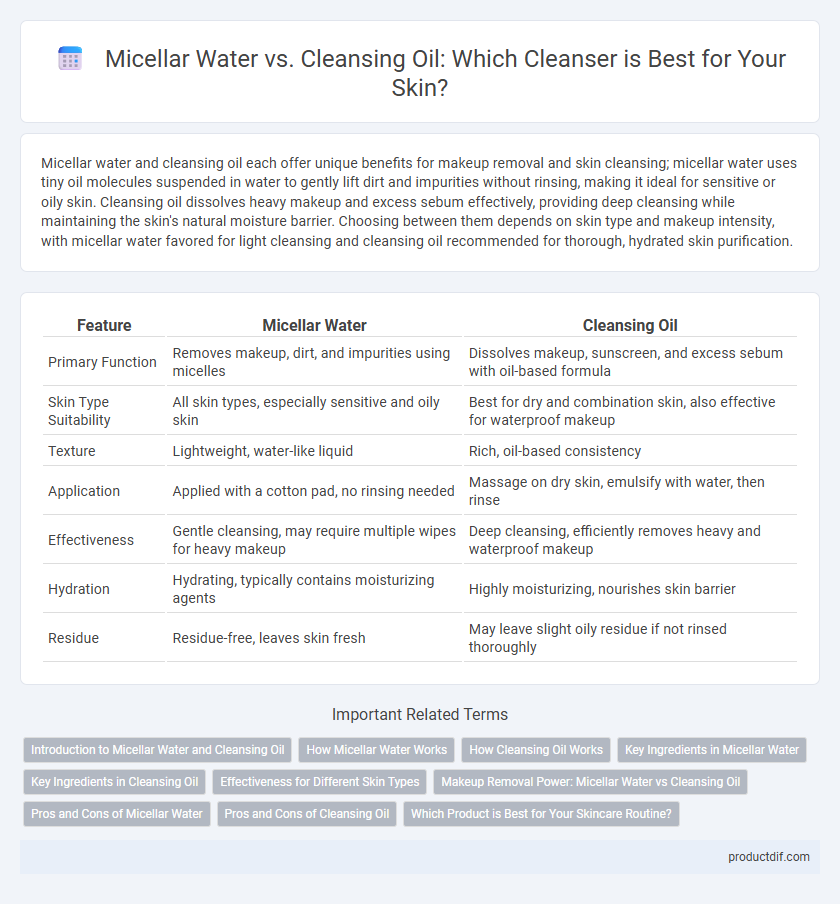Micellar water and cleansing oil each offer unique benefits for makeup removal and skin cleansing; micellar water uses tiny oil molecules suspended in water to gently lift dirt and impurities without rinsing, making it ideal for sensitive or oily skin. Cleansing oil dissolves heavy makeup and excess sebum effectively, providing deep cleansing while maintaining the skin's natural moisture barrier. Choosing between them depends on skin type and makeup intensity, with micellar water favored for light cleansing and cleansing oil recommended for thorough, hydrated skin purification.
Table of Comparison
| Feature | Micellar Water | Cleansing Oil |
|---|---|---|
| Primary Function | Removes makeup, dirt, and impurities using micelles | Dissolves makeup, sunscreen, and excess sebum with oil-based formula |
| Skin Type Suitability | All skin types, especially sensitive and oily skin | Best for dry and combination skin, also effective for waterproof makeup |
| Texture | Lightweight, water-like liquid | Rich, oil-based consistency |
| Application | Applied with a cotton pad, no rinsing needed | Massage on dry skin, emulsify with water, then rinse |
| Effectiveness | Gentle cleansing, may require multiple wipes for heavy makeup | Deep cleansing, efficiently removes heavy and waterproof makeup |
| Hydration | Hydrating, typically contains moisturizing agents | Highly moisturizing, nourishes skin barrier |
| Residue | Residue-free, leaves skin fresh | May leave slight oily residue if not rinsed thoroughly |
Introduction to Micellar Water and Cleansing Oil
Micellar water is a gentle, water-based cleanser composed of micelles--tiny oil molecules suspended in water--that effectively attract and remove dirt, makeup, and impurities without harsh rubbing. Cleansing oil, a lipid-rich formula, dissolves heavy makeup and sunscreen by breaking down oils and sebum, leaving the skin nourished and hydrated. Both products cater to different skin types and cleansing preferences, with micellar water suited for sensitive or oily skin, while cleansing oil is ideal for dry or combination skin needing deep hydration.
How Micellar Water Works
Micellar water works by using micelles, tiny oil molecules suspended in soft water, to attract and trap dirt, oil, and makeup from the skin's surface without harsh rubbing. Its gentle formula effectively cleanses while maintaining the skin's natural moisture balance, making it ideal for sensitive or dry skin types. Unlike cleansing oils that require emulsification with water, micellar water rinses off easily, leaving no greasy residue.
How Cleansing Oil Works
Cleansing oil emulsifies with water to dissolve and lift away makeup, sunscreen, and excess sebum from the skin's surface and pores without stripping natural moisture. Its oil-based formula effectively breaks down waterproof and long-wearing products by binding to impurities, allowing for gentle removal during rinsing. This method supports maintaining skin hydration and barrier integrity compared to harsher cleansing agents.
Key Ingredients in Micellar Water
Micellar water primarily contains micelles, tiny lipid-based molecules that attract and trap dirt, oil, and makeup without stripping the skin's natural moisture. It often includes hydrating agents such as glycerin and soothing ingredients like chamomile or rose water to calm the skin during cleansing. These key components make micellar water an effective yet gentle option for removing impurities while maintaining the skin's hydration balance.
Key Ingredients in Cleansing Oil
Cleansing oil typically contains key ingredients such as natural oils like jojoba, camellia, or sunflower oil, which effectively dissolve makeup and impurities while nourishing the skin. Emollients and gentle surfactants in cleansing oils help maintain the skin's moisture barrier, preventing dryness and irritation. These ingredients work synergistically to provide a thorough yet hydrating cleanse, making cleansing oils ideal for removing heavy makeup and sunscreen.
Effectiveness for Different Skin Types
Micellar Water effectively removes dirt and makeup while being gentle on sensitive and oily skin due to its lightweight, water-based formula. Cleansing Oil excels at dissolving heavy makeup and sunscreen, making it ideal for dry or combination skin types that require deep hydration. Both options provide thorough cleansing, but selecting the right product depends on individual skin needs and tolerance to oils or surfactants.
Makeup Removal Power: Micellar Water vs Cleansing Oil
Micellar Water uses micelle molecules to attract and lift away makeup, effectively removing light to moderate cosmetics without harsh rubbing, making it ideal for sensitive skin. Cleansing Oil excels at breaking down heavy, waterproof makeup and stubborn residues by dissolving oils, providing a deeper cleanse and leaving skin nourished. The choice between Micellar Water and Cleansing Oil depends on makeup intensity and skin type, with Cleansing Oil offering superior removal power for long-lasting or waterproof products.
Pros and Cons of Micellar Water
Micellar water effectively removes makeup and impurities with a gentle, water-based formula suitable for sensitive skin, making it an excellent option for daily cleansing without rinsing. However, it may struggle to fully dissolve heavy or waterproof makeup compared to cleansing oils, which provide deeper cleansing by breaking down oils and stubborn residues. While micellar water offers convenience and hydration, its limited ability to remove oil-based products can require additional cleansing steps for complete skin clarity.
Pros and Cons of Cleansing Oil
Cleansing oil effectively dissolves heavy makeup and sunscreen, providing a deep cleanse while maintaining skin's natural moisture barrier, ideal for dry or sensitive skin types. It may leave a slightly oily residue, potentially causing breakouts for oily or acne-prone skin if not rinsed thoroughly. The emollient properties support skin hydration but require proper formulation to ensure non-comedogenic benefits.
Which Product is Best for Your Skincare Routine?
Micellar water effectively removes light makeup and impurities with gentle micelles, making it ideal for sensitive or acne-prone skin and quick cleansing. Cleansing oil excels at dissolving heavy, waterproof makeup and excess sebum, providing deeper hydration and nourishing benefits for dry or mature skin types. Choosing the best product depends on your skin type and makeup intensity, with micellar water suiting mild cleansing needs and cleansing oil offering thorough purification for more resistant residue.
Micellar Water vs Cleansing Oil Infographic

 productdif.com
productdif.com